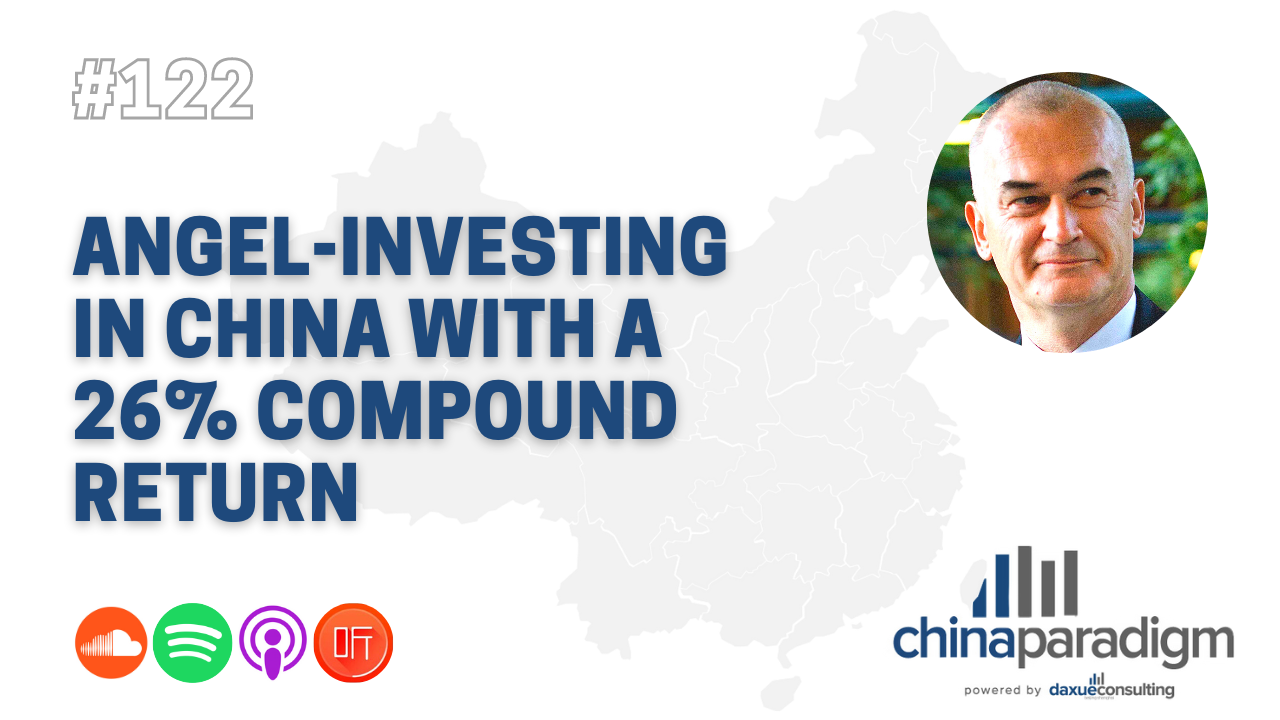Philip Beck is an entrepreneur, mentor, and angel investor in China. He has an annual return of 24% on his angel investments in China, and he has been in the field for the last 11 years. Philip previously worked in leadership roles at publicly listed advertising companies. He also is co-founder and CEO of two data companies. One of his companies, Moojing, gives brands comprehensive competitor analysis.
Listen to the full China Paradigm episode 122 on Youtube, Apple Podcast, Spotify, Soundcloud, or Ximalaya.
What made Australian Philip Beck put down roots in China?
Philip Beck: I first came here with my father when I was 8 years old. I was blown away by the magic of the country, and I’m still being blown away by the magic of China daily.
Why is life in China “7 times faster” than in Australia?
Philip Beck: There is the Big Mac index, and I use a “subway index” analogy. China’s infrastructure develops about 7 times faster than back in Australia. Also, in one year of working here, I make about 7 times more decisions than I would if I were working back home in Australia.
How does Philip Beck identify a screening method for good investing?
Philip Beck: I invest primarily based on the strengths of the team. I won’t invest in a team of 1. I don’t like to invest in teams of more than 3. To an angel investor in China, it’s essential to have at least one Chinese member in the team. And I look for teams whose members complement each other’s skills. So, if one team member is weak in one aspect, the other team members must make up for their deficiencies and vice versa.
In how many companies has Philip Beck invested in since 2009?
Philip Beck: About 25, I generally invest in about 1 new company every 6 months. 18 of the investments I have made as an angel investor in China have failed, and 7 of them have succeeded
How does an angel investor in China protect themselves from making bad investments?
Philip Beck: When I was new to being an angel investor in China, I made many mistakes, and then I got in with some co-investors at the angel stage. About 75% of my investments are with other angel investors, and maybe 25% are scenarios where I am the first angel to go in. The key thing is always setting out with the start-up exactly what they are trying to validate with the funds they seek.
Does Philip Beck belong to a pool of angel investors in China?
Philip Beck: There is a pool of angel investors here like Anglelvest, Shanghaivest. There are also overseas pools, but the angel community in China is quite small and close. Therefore, we know each other’s areas of interest and expertise. Sometimes I will come across a project that I think looks really good, but I will know another investor with much more experience in that field to pass that opportunity onto another angel. Likewise, they will refer other opportunities to me. I was originally in some pools, but now I just use my network to find new projects. Occasionally an angel investor in China will come across projects in accelerator programs that may be interesting to invest in.
Why is Philip Beck involved in angel investing in China rather than real estate investing in China?
Philip Beck: As good an investment as real-estate is, I have no desire to own 17 properties. People have shown trust in me throughout my working life. I want to repay that trust in kind by mentoring and investing in people who want to build their careers. One of the best bosses I ever had was Peter Irvine, he was my first boss, and I worked under him for 14 years. He always showed trust in me and gave me incredible guidance. Peter is a wealthy man. He could retire, but he is still committed to helping entrepreneurs become successful and helping people realize their true potential in life.
What is Philip Beck’s current rate of return on his angel investments in China?
Philip Beck: About 24% annually. There’s no magic formula for a great ROI, most of the start-ups will fail, and those that succeed will succeed spectacularly.
What is Philip Beck’s focus after angel investing in a company in China?
Philip Beck: Generally, I give advice and leverage my network, but keep equity and take a back seat role when a company gets to series A round investment. Before that, I will work with a start-up to make sure all the initial problems and issues are dealt with. That is where I excel. When a company is doing very well, I can have reverse-Midas touch because I like to break things down and solve problems. It’s a useful skill at the start but can be detrimental when the business is going well.
How are the companies that Philip Beck is still invested in performing currently?
Philip Beck: Roughly 10 out of every 100 investments an angel investor in China or anywhere else makes will survive. 50% will fail within 12 months. The other 40% will fail within 3-5 years, the reaming 10 or so will survive, and probably one out of the 100 will pay you back about 30 times your initial investment.
I’ve made roughly two of those 30x investments. One company I invested in at the angel stage made more money than everything I had ever previously invested, it covered all my failures, and I still hold equity. The second one is about to exit too, so that one has done very well too.
For most of the companies, it’s a 7-year journey before I can exit. Long-term investing offers a much better outcome. Which’s why I like to keep equity in those companies.
Should investors also be vetted by company founders?
Philip Beck: I would advise companies looking for investment not to look for investors but to look for other companies that are doing something similar. Then, ask the founders of those companies to introduce them to their investors. This way has much more power than an entrepreneur simply reaching out to an angel investor in China. Founders reaching out to other founders is the best way, in my opinion, because successful founders will often give you invaluable information about the angel investors that were and those that weren’t helpful to them in their journey.
In what business sectors do foreign entrepreneurs have a bigger chance of succeeding in China?
Philip Beck: They can be successful in any category, but they need to be respectful of China, use their ears more than their mouth, and always keep in mind that the Chinese member of their team will eventually need to be the public face of their company in China.
What do clients value most about Philip Beck’s non-executive involvement in their companies?
Philip Beck: I always cut through the bull. I’m not willing to pussyfoot around problems. If there’s the elephant in the room, I’ll make everybody talk about it. Then we’ll get that elephant out of the room.
Are entrepreneurs late on deciding to get coaching for their businesses?
Philip Beck: Yes, I was personally too late. I needed people to call me out on things earlier on in my career, but nobody around me would do that. I learned it when I was 38, but I wish I had learned it in my 20s. Coaches helped me avoid unnecessary conflict and tension, which are useful in the growth stage but not helpful in the post-growth stage.
Breaking things – the process of growth for companies
Philip Beck: It’s about knowing when to walk away from the company, knowing when you don’t have much more to contribute to the company’s development and when you’re going to start having a negative impact by constantly stretching the business to breaking point. I really respect Jack Ma for doing that. He realized he wasn’t the best person to lead Alibaba anymore and had a long-term plan to get out, and then he put Daniel in charge.
Moojing Market Intelligence – how do they extract data from the marketplace?
Philip Beck: We crawl or scrape the data available on public pages on Chinese platforms like Kaola, Suning, Taobao, Tmall, JD, VIPshop, and some other e-commerce platforms to give brands an idea of what their competitors are selling, how many sales they are making, their competitors’ price points, what regions their competitors are stronger in, what the consumers are saying about their competitors’ products in the comments section. We scrape the data for 99% of the products available on e-commerce platforms, and that equates to about 100 million products every month. We give our clients an excellent idea of what the market is doing and demanding.
There are some issues with this kind of software, such as not every product review being genuine and the publicly available data doesn’t show the return rate. But there are ways to get around this kind of problem, such as placing massive order quantities and seeing how many a certain product is available. Also, we are aware of the kinds of products that have a high return rate, like female apparel/ shoes/ fashion accessories, etc., and products that have a low return rate like mobile phones.
Why are APIs less used for data gathering in China than scrolling and crawling?
Philip Beck: The e-commerce platforms in China just don’t want to share their data.
Can Moojing be used as a tool by investors to make smart investments?
Philip Beck: Yes, it can and is used by investors.
Because Moojing is a SaaS company, does it offer another layer of services to its users?
Philip Beck: Our services cost about 3,000 USD per year, so it is very competitive. Some brands and investment funds now just want our raw data and don’t want to use our platform because they have hired their own data scientists to analyze the data. Those clients just want us to build an API link that links the data on our platform to their own data warehouse, and they just want to analyze it themselves.
What is Philip Beck’s view on the evolution of advertising in China in the past 10 years?
Philip Beck: My biggest criticism of publicly listed advertising agencies is the abdication of their core responsibility to their clients, which is to guide clients towards understanding consumer behavior and then identifying how the client’s brand can influence that consumer. A lot of their profits were coming from areas like media rebates which is a legal grey area. And so, when digital came along, they were looking out for themselves and their profits rather than looking out for how to serve their clients better.
A lot of new international and local small digital companies have come up to take their market share.
How does Philip Beck manage his time?
Philip Beck: I get up at 4 o clock every day. For the first 2 hours, I do some reading, read the news, review the previous day. I use Google Calendar to manage my time. Then I do yearly reviews in the second week of December of my time in the next year. Focusing on cutting things and adding new things into my schedule. I always allow at least 1 hour a day for what I call “Oh Shit,” which is where you have an emergency meeting or have to put out some fire somewhere.
Generally, my time is 50% between my 2 companies Moojing and DianYue, 25% mentoring young Chinese professionals, 25% on my non-executive roles at companies.
How does Philip Beck say “No”?
Philip Beck: A big thing for me was learning how to say “no” to help other people because my time was already so stretched. But when I have to say no, first, I say thank you for asking me. Even though I would love to help you, I just don’t have the capacity at the moment, and then I always try to find somebody who would probably be able to help that person. So, I’ll ask them if they’re ok with that. Then I’ll connect them with the person I think could help them and try to set up contact between them.
Are to-do lists still a relevant way to approach a business schedule?
Philip Beck: My assistant and I use my Google Calendar to schedule everything. Also, if I can’t deliver something on time, I always try to let them know a week or 2 in advance.
Tips for entrepreneurs from an angel investor in China
- Instead of looking out for angel investors in China to fund your new business, look for founders in a similar industry and ask them about which angel investors would be the best to work with
- Have at least one member of your team be Chinese and make sure each team member has complementary skills/ talents
- Be precise about what you need the funds for, and what theories/ ideas those funds will validate. This will help you when you move onto other funding rounds
- Most angel investors in China rely on their network to supply them with new investment opportunities, rather than accelerator programs
- Angel investors like Philip Beck are investing primarily because they want to help young business people, rather than out of a necessity. Angel investors in China will use their business network and personal experience to help take your company to the next level. For Philip Beck, the entry to exit duration for successful start-ups is roughly 7 years
Listen to the full China Paradigm episode 122 on Youtube, Apple Podcast, Spotify, Soundcloud, or Ximalaya.





